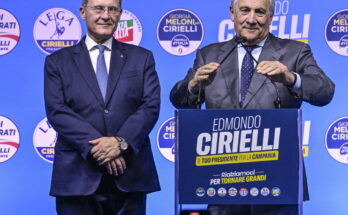Africa, so close to Europe, represented an invaluable source of supply of industrial, strategic and valuable raw materials for Europe. Therefore, any disruption, or shortcoming in the logistics chain connecting the two countries, represents a risk to the security of supply of a large number of industries in this Mediterranean region. Therefore, we must pay close attention to any disruptions, or bottlenecks, in Africa’s supply chains.
By Gérard Vespierre
Many African countries represent key sources of supply for European industry, with the automotive, energy and technology sectors being their main end users.
The raw materials in question fall into three large families, industrial raw materials, copper, iron, bauxite, strategic materials, cobalt, coltan, lithium, and precious materials, gold, platinum. According to the latest available data from the European Commission and the OECD, the total amount of African mineral imports from Europe annually amounts to 25 billion euros. The main producing countries exporting to Europe are South Africa, Ghana, Guinea, Zambia, DRC. The main European industrial countries are natural customers, France, Germany, Italy, Spain, Belgium, the Netherlands.
Priorities set by the EU
This dependence prompted Brussels to implement initiatives such as the Critical Raw Materials Act (CRMA) and strategic partnerships with African countries to secure supplies. One of CRMA’s goals is to strengthen supply chain resilience, one of which is the role of partnerships. The European Union has established these special relationships with several African countries to secure supplies of essential minerals, while supporting environmental and social standards. The main partner countries are the Democratic Republic of the Congo (DRC), Rwanda, Namibia and Zambia
.
This formalization includes aspects of production availability. The question of operational logistics then arises, namely the establishment of transportation infrastructure. We now better understand the importance of port and rail infrastructure in Africa and the proper functioning of that infrastructure.
Harbor battle
Africa’s maritime connection with the sea is clearly visible, because this continent opens into 2 seas and 2 oceans. 54 states make up the continent, and 38, or more than two-thirds, have maritime fronts. The remaining 16 countries, which are landlocked, create pressure and responsibility on the 38 ‘maritime’ countries to guarantee the transit of their trade and resources.
CESA, the Center for Strategic Studies for Africa, estimates that China is involved in 78 African ports as a financier, builder or operator, or 33% of all port infrastructure on the continent. China’s presence in Africa’s port sector is unmatched in any other country in the world.
The United Arab Emirates, as part of its international strategic development, is currently a major player, with its main operator, DP World. The UAE is also encouraging new entrants, such as Abu Dhabi Ports, which has a strong presence in East Africa, its natural zone of influence, and competes with China.
France is experiencing a decline in the ports and logistics sector in Africa, with the sale of the African assets of the Bolloré group, Africa Logistics. However, our country still maintains the assets of the global maritime transport giant, CMA-CGM, which is very active in Nigeria and also in Cameroon.
The main African ports related to mineral exports are the ports of Richards Bay (South Africa), Takoradi (Ghana), Lobito (Angola), Dar es Salaam (Tanzania) and Conakry (Guinea). They are spread over two continental ocean surfaces.
But from the port it will be easier to receive and send to the depths of the continent. Therefore, railways are another important logistics link.
Corridors, and train fights
There are of course many rail “corridors” to supply strategic port outlets in Africa. It is important to name and present them because these channels are not well known and are not considered important. The reliability of supply to European industrial sites depends on its availability, and its maintenance free from any conflict.
The Lobito Corridor, named after a port in Angola, offers opportunities for Zambia and the Democratic Republic of Congo.
The Beira Rail Corridor connects the port of Beira, Mozambique, to the city of Bulawayo, Zimbabwe. Stretches about 850 km.
The Central Corridor connects the port of Dar es Salaam on the western tip of Tanzania, to the western tip at Kigoma. This is part of a regional strategy aimed at connecting Tanzania with Burundi, Rwanda and the Democratic Republic of Congo, thereby facilitating trade and mobility in the Great Lakes region.
The Liberty Corridor, backed by the United States, is planned to transport iron ore from Guinea to Liberia’s main port via the Yekepa-Buchanan railway.
Lack of maintenance and train congestion sometimes limited its effectiveness. Several corridors are being targeted for investment to increase train capacity and reduce logistics costs. The US, China, EU and Japan are investing in these corridors to secure access to critical minerals.
All these elements of the analysis of Africa’s logistics, port and rail chains allow us to better understand the significance of the Liberian President’s recent visit to France.
Strategic visit
The visit of President Joseph Nyumah Boakai in late October initiated the strengthening of economic and commercial relations between Liberia and France. This is an opportunity to sign a general economic cooperation agreement, to strengthen cooperation in several economic sectors, renewable energy and mining, as well as education and health. This was also an opportunity to discuss the creation of a Franco-Liberian chamber of commerce.
The recent discovery of significant reserves of iron ore, uranium and lithium could bring several billion euros in revenue to the country’s economy. However, exploiting these resources requires investment in infrastructure.
This visit was an opportunity for President Boakai to meet the leaders of the Arcelor Mittal (AML) group. The group holds exclusive operating rights to a 250km railway line linking the port of Buchanan to the mining town of Yekepa in the east of the country, very close to the Guinean border. These rights also applied to the large iron mines and harbor of Buchanan. This situation of exclusivity reduces the economic potential of the infrastructure: it prevents its use by other operators, in accordance with the government’s desired directives, and hinders the transit of Guinea’s resources.
Therefore, this situation is important for the imperative of the free logistics movement of Africa’s mineral resources, which is important for the European Union. This also had an impact on Liberia’s economy.
The consequences for Liberia
Arcelor Mittal’s latest financial report cited record production and exports of iron ore from Liberia. He underlined this contribution to the group’s growth. This year, AML shares are up more than 50%. Despite these figures, it is also worth noting that the group does not publish its local income, the amount of taxes paid, or the amount of dividends transferred to the State of Liberia for its 15% stake.
An amended version of the initial 2005 MDA (Mineral Development Agreement) was signed in 2021 to allow for the expansion of mining, logistics and port activities. Therefore, this shows that negotiations are possible.
MDAs are also subject to legislative approval and can therefore be amended or renegotiated, thereby limiting the principle of primacy over national law.
This situation, widely discussed in the media, clearly reveals the challenges and constraints facing Africa’s logistics infrastructure. This also illustrates the importance of national governments being able to develop their economies according to their own choices.
The French government can only pay attention to the resolution of the contract for the management of this logistics corridor, which is of great importance for the Liberian economy, and from a general point of view, to the balance of the circulation of African raw material flows, which is closely monitored by the European Union.
Geopolitical analyst, ISC Paris graduate, Master of management, DEA finance Dauphine PSL, founder of web media www.le-monde-decrypte.com IDFM 98.0 columnist


